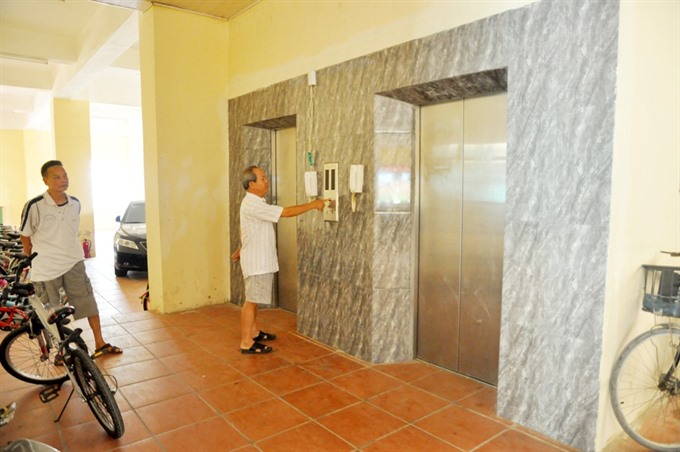Apartment building elevators a death trap
 |
| Elevators in the G5 apartment building in Đại Kim urban area, Hoàng Mai District, Hà Nội. A series of fatal elevator accidents that occurred recently at apartment buildings have raised concerns over the safety of residents. - Photo cafef.vn |
Just last week, while a maintenance worker was on his way to repair an elevator stranded at the second floor of an apartment building in HCM City’s District 9, a security officer died after falling five metres down the elevator shaft.
On July 9, visitors to Bitexco Financial Tower Building in HCM City had to call for help after the elevator came to a halt while travelling from the ground floor.
Less than two months earlier, seven workers of the HCM City-based Hùng Thắng Phát Company were injured due to a broken elevator cable.
Elevator incidents are also common at apartment buildings in resettlement areas like Xuân Đỉnh, Đền Lừ and Hoàng Mai in Hà Nội.
Đặng Thúy Hằng, 42, living in the Đền Lừ resettlement area recalled a frightening moment when she was trapped in an elevator.
“Being trapped in the elevator is an everyday occurrence to residents living in this building,” she said.
“Each time it rains, water floods the elevator. No one dares step inside because of the risk of an electric shock,” Hằng said.
Loose management
Hà Nội Housing Management and Development Company, which manages resettlement apartment buildings, said that the unit is operating 204 elevators in high rises, 33 of which are broken.
According to Nguyễn Hồng Thái, deputy director of ThyssenKrupp Việt Nam Company, which specialises in elevator installation and maintenance, safe elevators must meet several criteria such as having functioning alarms, fans, lights and standby generators.
An elevator maintenance worker named Giang working at a high rise on Lê Văn Sỹ Street, Tân Bình District, HCM City said that one of the reasons behind the broken elevators is poor operation and maintenance. According to regulations, elevators must receive maintenance once every one to two months.
“While using elevators, many residents fail to follow usage instructions. Meanwhile, investors do not have a frequent maintenance schedule or replace broken equipment,” Giang said, adding that these failures unavoidably lead to incidents.
According to many residents interviewed by the Thời Báo Kinh Doanh, some companies importing the elevators cut out safety systems to reduce the chance of manipulation and cut costs.
An officer from a centre for monintoring technique safety in HCM City told the newspaper that the elevator’s safety assessment is not conducted regularly.
Many elevators in residential quarters, hotels and schools have been in use for nearly ten years but have not been checked once. Meanwhile, safety regulations and management work at these facilities have become obsolete and unprofessional, he said.
Regarding the dozens of elevator accidents that happen every year, the question of who should take responsibility is still unclear.
What the stars mean:
★ Poor ★ ★ Promising ★★★ Good ★★★★ Very good ★★★★★ Exceptional
Latest News
More News
- Congratulations from VFF Central Committee's int’l partners to 14th National Party Congress (January 25, 2026 | 09:46)
- List of newly-elected members of 14th Political Bureau announced (January 23, 2026 | 16:27)
- 14th Party Central Committee unanimously elects To Lam as General Secretary (January 23, 2026 | 16:22)
- List of members of 14th Party Central Committee announced (January 23, 2026 | 09:12)
- Highlights of fourth working day of 14th National Party Congress (January 23, 2026 | 09:06)
- Press provides timely, accurate coverage of 14th National Party Congress (January 22, 2026 | 09:49)
- Press release on second working day of 14th National Party Congress (January 22, 2026 | 09:19)
- Minister sets out key directions to promote intrinsic strength of Vietnamese culture (January 22, 2026 | 09:16)
- 14th National Party Congress: Renewed momentum for OVs to contribute to homeland (January 21, 2026 | 09:49)
- Party Congress building momentum for a new era of national growth (January 20, 2026 | 15:00)
















 Mobile Version
Mobile Version